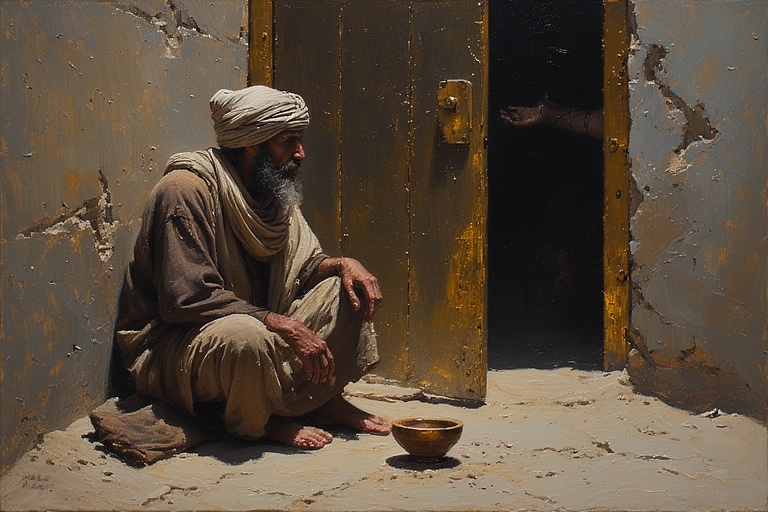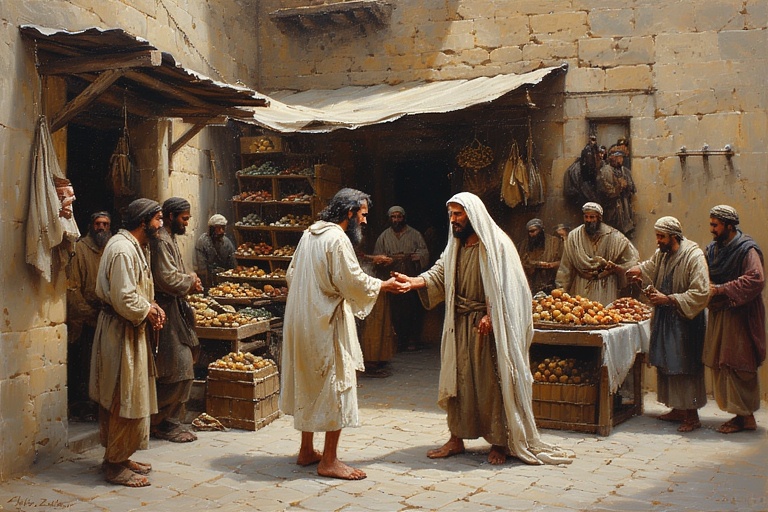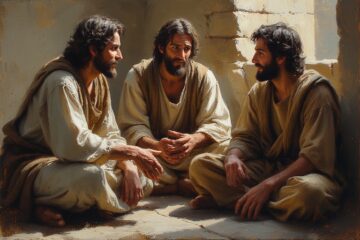The admonition to the church in Laodicea, found in Revelation 3:18, presents perhaps a paradoxical transaction: Christ counsels what is noted as a financially prosperous community to buy from Him true gold refined in the fire. This is not a call to a simplistic transaction, as a purchase in a market place but an invitation to a transformative exchange of values, where the illusion of security and safety in wealth, of self-sufficiency which has led them to spiritual complacency is surrendered for the authentic, tested riches of salvation, faith, grace, and divine purpose. The ‘buying’ is an act of humble recognition of one’s own spiritual poverty and a turning to Christ as the sole source of what constitutes true, real treasure of exceeding value.
The Laodicean context of tepid self-reliance finds its direct parallel in the modern church’s temptation to measure its vitality by cultural influence, financial security, and numerical growth rather than by the fiery, refining work of the Spirit in the heart of the believer. The transaction when we dig deeper is therefore one of faith itself – a relinquishing of our own metrics of “success” to receive from Christ a success, a wealth that is purified through trial and anchored in eternity.
I counsel you to buy from me gold refined by fire, so that you may be rich, and white garments so that you may clothe yourself and the shame of your nakedness may not be seen, and salve to anoint your eyes, so that you may see.
Revelation 3:18 (ESV)
The transaction for TRUE gold
The third chapter of the Book of Revelation concludes Christ’s letters to the seven churches of Asia Minor with a message for the church in Laodicea (starting at verse 18), a community that is distinguished not by its zeal for the Gospel, for the salvation found in Christ but by its almost nauseating lukewarmness. Situated in a city renowned for its financial wealth, its medical school producing a famous eye salve of the time, and its thriving textile industry, the Laodicean church had tragically internalised its civic identity to its spiritual detriment. Does that sound familiar at all?

They professed, “I am rich, I have prospered, and I need nothing,” yet from the perspective of the kingdom of heaven, they were but “wretched, pitiable, poor, blind, and naked” (Revelation 3:17). It is in this stark context of divine diagnosis versus human understanding that Christ offers the paradoxical prescription of verse 18: “I counsel you to buy from me gold refined by fire, so that you may be rich, and white garments so that you may clothe yourself and the shame of your nakedness may not be seen, and salve to anoint your eyes, so that you may see.”
This series of commands, particularly the call to “buy gold,” first struck me as a curious transaction. How does one buy something from someone who has just declared them bankrupt, further, how does one offer to Christ anything that could match the value of the purchased item?
But, there is a deep truth within this seeming paradox and it lies in understanding the nature of the transaction, the substance of the gold, and the application of this exchange both to its original audience and to the contemporary church. By exploring the exegetical insights of key figures throughout Christian history, from the early Church Fathers to revered Protestant and Catholic theologians of the modern era, we can begin to unpack the rich, challenging meaning of this verse and its urgent relevance for faith today.
The nature of divine commerce and humble receipt
I think the initial concepual hurdle (at least for me) was “to buy.” In a straightforward commercial sense, it implies an exchange of value, a purchase where the buyer offers something in return for a desired commodity. Yet, the Laodiceans are spiritually destitute; they have no currency that would be acceptable in heaven’s economy. This very formulation therefore is a profound theological statement about the nature of grace. It echoes in a very real way the invitation in Isaiah 55:1: “Come, everyone who thirsts, come to the waters; and he who has no money, come, buy and eat! Come, buy wine and milk without money and without price.” The “buying” is an act of the will (no matter what your position on will is), a decisive turning and receiving, which itself is predicated on a recognition of one’s own poverty. One must first accept the diagnosis of being “wretched and poor” before one can seek the remedy. The decision to act on the impulse to buy, now is that God-given or is that a human-founded impulse?

The early Church Father Irenaeus, in his seminal work Against Heresies (pdf here), grappled with this concept. He interpreted the “gold refined by fire” as faith itself, a faith that is purified and made genuine through the trials and tribulations of life. For Irenaeus, this refining process was integral to the soul’s development and its liberation from the dross of material attachment. The transaction, then, is not one where the Laodiceans offer their own resources but, where they offer their need they must cast aside their comfort in material riches and accept that they have become lukewarm for the very thing they and all of us need. They exchange their illusory self-sufficiency for the authentic, tested faith that only Christ can provide. This aligns with the Augustinian understanding of grace, wherein God gives what He commands. Augustine would argue that the command to “buy” is itself a divine enablement, stirring the heart to seek what God freely offers (and I personally agree with him, not that my agreements matters much!). The price, in this spiritual economy, is the humility to admit one has nothing and to receive everything from the one who stands at the door and knocks (Revelation 3:20).
This interpretation is also powerfully affirmed by the 18th-century Presbyterian commentator Matthew Henry. In his Exposition of the Old and New Testaments, Henry explains further that the cry to buy is an instance of Christ’s condescending grace. He writes,
“He counsels them to buy, which implies that they were weak and foolish, and unable to advise themselves… and that Christ himself had the merchandise, was the sole proprietor of these precious wares.”
Henry identifies the gold as “the true grace of God,” the garments as “the righteousness of Christ,” and the eye salve as “the spiritual discernment” of the Holy Spirit. The transaction is thus a comprehensive exchange: our moral bankruptcy for His justifying righteousness, our spiritual blindness for His illuminating insight, and our naked shame for His perfect covering.
Laodicea is a mirror held up to spiritual complacency
To fully appreciate the force of Christ’s counsel, I think we must also consider the specific historical and cultural context of Laodicea. The city was a banking centre, a place where financial transactions and the accumulation of material gold were daily realities (Think of the banking sector in London). For Christ to command them to buy true gold from Him was a direct subversion of their foundational source of pride and security. Their earthly wealth had blinded them to their very real spiritual poverty. Similarly, Laodicea’s famous Phrygian powder was used to make a salve for treating eye ailments and even this is countermanded by the offer of a superior salve from Christ to heal their spiritual blindness. Then their textile industry, famed as they were for their fine black wool garments, even these are revealed as worthless compared to the white garments of Christ’s righteousness that cover the shame of sin.
The transaction, therefore, was a call to repent of their idolatrous trust in created things and to transfer their confidence to the Creator. Their lukewarmness – the state that Christ says makes Him want to vomit (which is pretty harsh to be honest) – was the direct result of this misplaced trust. They were not hot with spiritual fervour nor cold in honest worldliness, but tepid in a comfortable, self-satisfied religiosity that required no dependence upon a crucified Saviour. The exchange offered was from a life of comfortable meanderings but ultimate damnation, to one of tested eternal salvation.
Charles Spurgeon, the great Baptist preacher, captured this stark choice in his characteristic style. In a sermon on this very text, he declared,
“You must be stripped of your fancied riches, or you will never be clothed with the riches of grace. You must confess your blindness, or you will never see.”
For Spurgeon, the transaction began at the cross, in an acknowledgement of utter helplessness that alone qualifies one to receive the unsearchable riches of Christ.

And this is Christ’s cry against affluent religion
The advisory to the Laodicean church resonates with unsettling clarity in many segments of the modern Western church, particularly in the UK but of course can be exampled across the entirety of Western Christianity. Where the Laodiceans trusted in their financial capital, the contemporary church is often tempted to trust in its cultural affirmation, social works, finances, buildings, and intellectual capital at the great and abiding expense of the truth of Christ. The world NEEDS the truth of the Gospel more so now and yet a lot of churches stand silent to the works of the devil as he strides abroad in the world, many churches lack the passion of the Gospel. For the Western church, success is frequently measured by attendance figures, the scale of building projects, media influence, and budgetary surpluses.
We have developed sophisticated “eye salves” in the form of marketing strategies, psychological programmes, and managerial techniques, yet we can remain blind to our deep need for genuine repentance, fervent prayer, and the unadulterated preaching of the cross. We clothe ourselves in the fashionable garments of political relevance and cultural engagement, swapping out worship of the Creator for what He has created, while neglecting the pure white robes of holiness and Christ-imputed righteousness.
The transaction Christ proposes is as radical now as it was then. He through this, counsels the modern church to exchange its metrics of success for the “gold refined by fire.” This true gold may not look like immediate numerical growth; it may look like a messy, faithful remnant enduring persecution, or a congregation whose love is purified through internal strife and testing. It is the gold of a faith that holds fast to Christ when the lights go out and the music fades or the daily pressures weigh heavy.
The 20th-century Catholic archbishop and effervescent communicator Fulton J. Sheen, though not a commentator on Revelation in a formal sense, frequently addressed this theme of true versus false wealth. In his works on the spiritual life, he consistently argued that the world offers the ersatz – the cheap imitation – while Christ offers the substance. For Sheen, the Laodicean temptation is to prefer the comfort of the ersatz, the lukewarm culturally-approved religion, to the demanding, refining fire of authentic discipleship. The transaction is a call to abandon the therapeutic, self-help model of faith and to embrace a theology of the cross, where suffering, sacrifice, and refinement are understood as the God-appointed means to genuine wealth.
The interior exchange
Ultimately, the transaction outlined in Revelation 3:18 is not merely for a church, an organisation or group but for the individual, it IS a profoundly personal call. It describes the continuous, interior journey of every believer to avoid comfort, to seek out TRUE gold. The Laodicean condition of lukewarm self-sufficiency is a constant threat to our individual souls and spiritual journeys – I know this myself for often I have become comfortable in my life, all seems to be going well and I forget the urgency of the Gospel, the call of my first love, the fullness of salvation found in Christ alone, through grace. Indeed, we are all prone to trust in our own moral and mortal accomplishments, our theological knowledge (such as it is!), or our religious routines (the satisfaction of a daily office done every morning for 30 minutes, perhaps formulaic rather than relational – we’ve all been there!) which become our own form of ‘gold’, rather than in Christ alone.
The call to “buy from me” is a daily invitation to divest ourselves of this counterfeit currency.
This is the process of sanctification, wherein the refiner’s fire purifies our faith, burning away the dross of self-reliance and pride. The gold we receive is not a static deposit but a living faith that is continually tested and strengthened through the circumstances of life. The white garments must be kept white, washed continually in the blood of the Lamb (Revelation 7:14), and the eye salve must be applied afresh to discern the temptations of the world and the subtle deceptions of the evil one. This personal transaction is an act of faith, a moment-by-moment dependence wherein we acknowledge our spiritual poverty and receive, by grace, the unsearchable riches of Christ. It is the practical outworking of Paul’s declaration in Philippians 3:7-8:
“But whatever gain I had, I counted as loss for the sake of Christ. Indeed, I count everything as loss because of the surpassing worth of knowing Christ Jesus my Lord.”
Key Objections and Rebuttals
Now, I do know that a potential objection to this interpretation might be raised from a rigorously Reformed or Calvinist perspective (of which if you know me, you will know I was one such), which emphasises the monergistic nature of salvation -that is, God works salvation entirely on His own. An objector might argue that the language of “buying” introduces a human work, a synergistic element where the individual must contribute something to the transaction, thereby undermining the doctrine of sola gratia (grace alone).
So, my rebuttal to this objection would lie in the consistent patristic and Reformed interpretation of the term “buy” as a metaphor for the act of receiving by faith. As demonstrated by Matthew Henry and Charles Spurgeon who were both stalwarts of Reformed orthodoxy, the “purchase” is made with the “currency” of faith, which is itself a gift of God (Ephesians 2:8). There is no contradiction because the very desire to “buy,” the recognition of one’s poverty that drives one to the market, is a work of divine grace in the heart. Christ’s counsel is the external call of the gospel, which effectively awakens and enables the response of faith through the internal call of the Spirit. The transaction, therefore, remains entirely within the economy of grace; it is a divine imperative that creates the human ability to comply. To refuse the command to “buy” under the pretence of protecting divine sovereignty is to misunderstand the gracious condescension with which it is issued.
If you have gotten this far…
I would just finish by saying that the counsel to the Laodicean church in Revelation 3:18 stands as a timeless and piercing diagnosis of the human (and particularly religious) condition. It exposes our proclivity for finding security in created things, in bank balances, in numbers, in affirmation or belongings and reveals them as the poverty-stricken delusions they are.
The transaction Christ proposes is the great exchange at the heart of the gospel: our sin for His righteousness, our blindness for His sight, our rags for His robes, our fool’s gold for His refined treasure.
It is an exchange that begins at the moment of conversion but continues throughout the Christian life as a continual call to deeper dependence. From Irenaeus to Sheen, the witness of the tradition is unified: the path to true riches lies through the confession of our own poverty and the joyful, humble reception of the boundless wealth offered by the one who, though He was rich, yet for our sake became poor (2 Corinthians 8:9).

The invitation remains open; the market of grace is still trading, and the price, by His astounding mercy, is nothing but our need.
Pax vobiscum



0 Comments